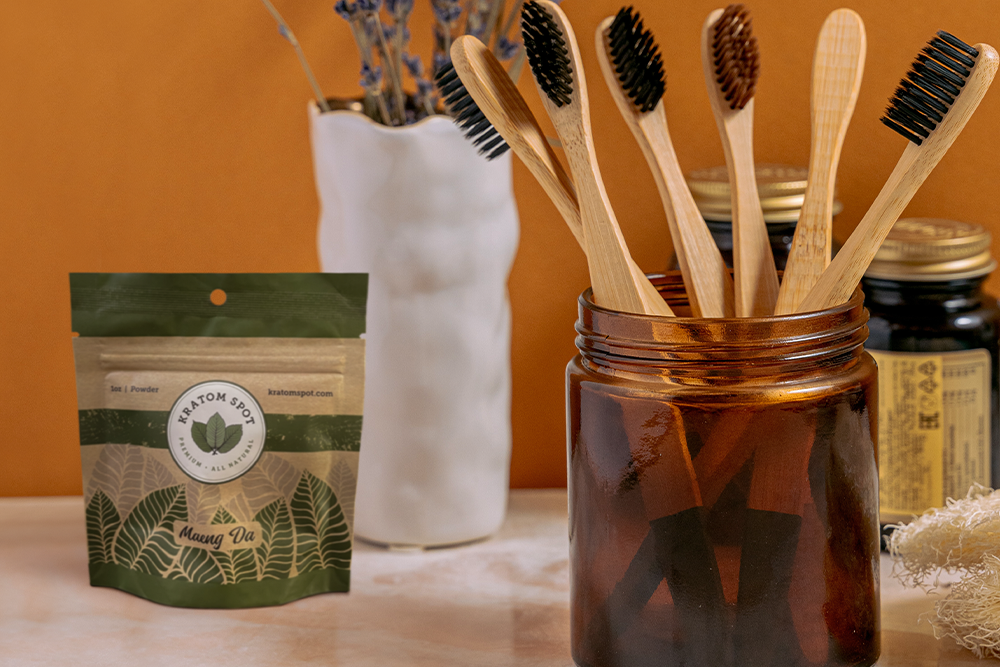
For some who use kratom, bad breath may be an increasing concern. While rare, some concerned users report that using kratom — or using certain kratom ingestion methods — can cause notable bad breath.
If you’re one of those who’ve experienced kratom-related halitosis, the good news is that there are a few effective methods that you can try. Odds are, one of these easy fixes will help clear up whatever kratom bad breath issues you may experience.
What Causes Bad Breath?
There are a number of causes of halitosis, both traditional and kratom bad breath. Identifying which cause is affecting you (or at least narrowing down proper causes) is an important step for clearing up a stinky mouth.
Bad breath can be caused by a variety of things. From poor oral hygiene to infections to diet and more, there’s a veritable cornucopia of reasons that your mouth might smell a little less pleasant than a bed of roses.
Among those, here are those that might be affected by kratom use.
Tonsil Stones
Tonsil stones are one of the most common causes of bad breath. Tonsil stones are caused by food particles, mucus, and other oral waste collecting in the back of the throat (where your tonsils are), then hardening over time in a process known as calcification.
Kratom powder could conceivably contribute to the formation of tonsil stones. That’s particularly true if you use the “toss and wash” method or drink kratom tea that still has raw kratom powder suspended in the liquid.
Both of these methods involve holding kratom powder in your mouth, and it’s entirely possible that some of that powder could get trapped in the back of your throat. If it gets caught on your tonsils, it’s very possible that kratom could contribute to the formation of tonsil stones.
What to do: if you have a history of tonsil stones or see a lump of white material in the back of your throat (that’s what they look like!), then it’s probably a good idea to switch to another kratom ingestion method.
- Using oblate discs instead of toss and wash will eliminate all kratom powder that could get caught in your throat.
- Switching from a powder-in kratom tea to a no-powder tea filled with kratom alkaloids will similarly eliminate all kratom sediment that could get caught in your tonsils.
Plaque and Tooth Debris
Outside of tonsil stones, debris caught between your teeth is the other most likely candidate for kratom-related bad breath.
When you chew food, little particles can get stuck between your teeth. If this debris stays there long enough, it can become a breeding ground for smelly bacteria. Over time, it can even calcify, causing tooth decay, infection, and gum disease — all of which, you guessed it, can smell terrible.
The “toss and wash” method, some forms of kratom tea (those with raw kratom powder suspended in the liquid), and other kratom ingestion methods that involve raw powder in your mouth could all result in kratom powder getting trapped between your teeth. Considering that many find kratom’s earthy smell unpleasant, that’s a recipe for kratom bad breath in both the short- and long-term.
What to do: if you toss and wash or drink kratom tea with powder, consider changing up your method.
- Using oblate discs instead of toss and wash will eliminate all kratom powder that could get caught in your throat.
- Switching from a powder-in kratom tea to a no-powder tea filled with kratom alkaloids will similarly eliminate all kratom sediment that could get caught in your tonsils.
If you’re married to your current method, consider flossing, using a water pick, and/or vigorously swishing mouthwash immediately after taking your dose of kratom.
Gunky Tongue
Your tongue can be a powerful source of stink breath. In fact, some studies have suggested that scraping your tongue is a better way to fight bad breath than brushing your teeth!
It’s conceivable that kratom could be contributing to stank-tongue; taking your dose orally, it’s inevitable that the tongue will be exposed to some of your dose. Some kratom powder could conceivably get lodged on the tongue, or the tongue could simply absorb a bit of kratom’s raw odor. That’s particularly true if you’ve already got a tongue that’s… a bit less than clean.
What to do: scrape your tongue. If you’re not already in the habit of doing so, tongue scraping is one of the best ways to improve your overall oral hygiene. Regardless of whether your halitosis is related to kratom, it’s highly likely that tongue scraping will improve the situation.
Outside of that, switching to a kratom ingestion method that doesn’t involve raw kratom powder in your mouth is likely to help. Kratom capsules or oblate discs are a great idea.
Kratom tea, regardless of whether it contains raw powder, may not be the best idea for tongue-related kratom bad breath. Tea will almost certainly have at least a hint of kratom’s earthy scent and would inevitably expose your tongue to the same.
Other Considerations
When it comes to kratom and bad breath, the three possibilities above are the most likely culprits. And the good news is that, for each, there’s a trick or two that are likely to cure the issue!
Outside of that, basic common considerations are always a good idea:
- Sugar-free gum or breath mints
- Good oral hygiene
- Regular trips to the dentist
- Adding mouthwash to your daily routine
If you find that these measures don’t address your halitosis, then it’s likely that there’s another, less obvious underlying cause. Talk to your dentist about their opinions. It’s also possible that another, non-dental health issue might be the underlying cause, so consulting your physician might be a useful step.
Again, there’s no inherent reason that kratom should affect your breath. Nonetheless, it’s conceivable that certain methods of kratom ingestion could exacerbate pre-existing issues with oral hygiene. Taking better care of your mouth can pay off in big ways, both for your health and your social life, and it’s important to root out the cause.

